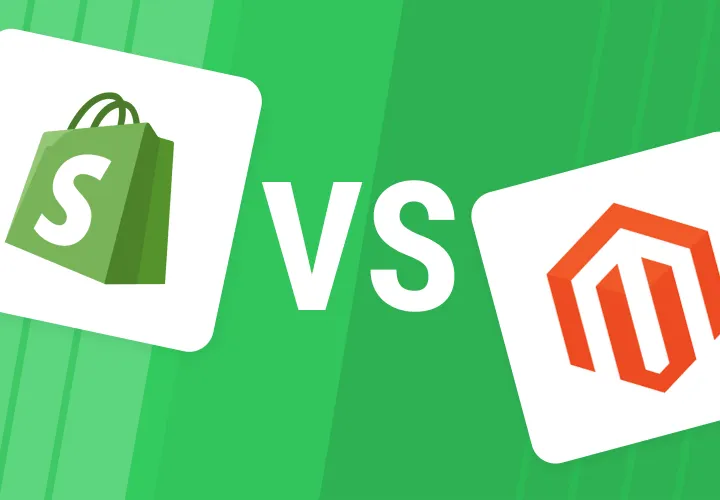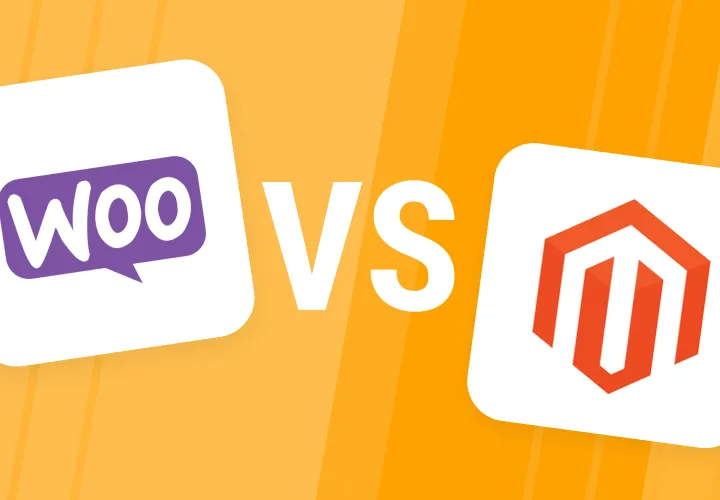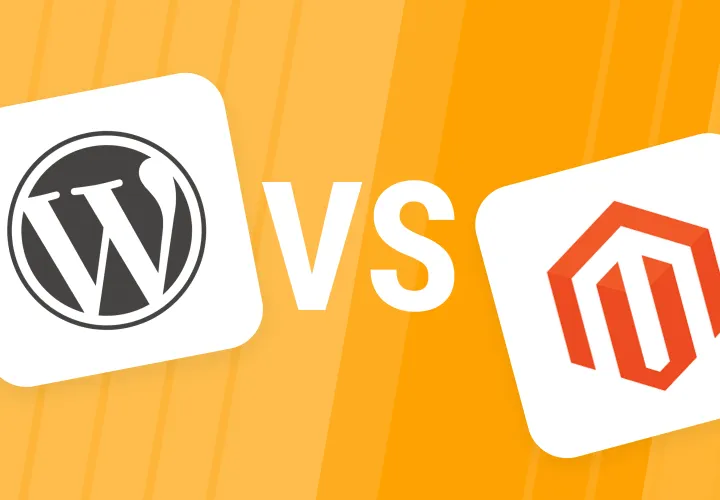BigCommerce or Magento? Choose Your Platform in 2025
Table of contents
In the realm of E-commerce solutions, the process of selecting an optimal platform for your business demands careful consideration. The market boasts a variety of options, including Shopify, BigCommerce, WooCommerce, Magento, and others, each presenting its own set of advantages and drawbacks. Businesses should meticulously assess various factors when navigating this decision-making process.
In this article, we aim to highlight the capabilities of two prominent contenders in the E-commerce platform arena: BigCommerce and Magento (Adobe Commerce). Keep reading to discover the insights necessary to make a well-informed decision that aligns with your unique requirements.

BigCommerce vs. Magento: At a Glance
BigCommerce
BigCommerce is a subscription-based E-commerce platform catering to businesses of various sizes, from sole proprietors to multinational corporations. With its subscription plans, BigCommerce offers unlimited products, file storage, and bandwidth, encompassing features like online storefronts, point-of-sale (POS) systems, sales channels, customer support, and gift card options. Additionally, the platform provides access to a wide range of BigCommerce apps, enabling businesses to enhance their store's functionality with tools for marketing, analytics, customer engagement, and more.
With 42,000 websites currently powered by BigCommerce, it stands as one of the smaller E-commerce platform providers in the market. Despite its smaller size, BigCommerce has a strong reputation for providing high-quality E-commerce solutions. BigCommerce boasts a client roster that includes established companies like Ted Baker, BMW, and Ben and Jerry’s, demonstrating its ability to handle the demands of serious businesses and organizations. This trust and capability have been recognized by TrustRadius, awarding BigCommerce a "top-rated" award for four consecutive years. This combination of a robust platform and proven track record makes BigCommerce a compelling option for businesses seeking a scalable and reliable E-commerce solution.
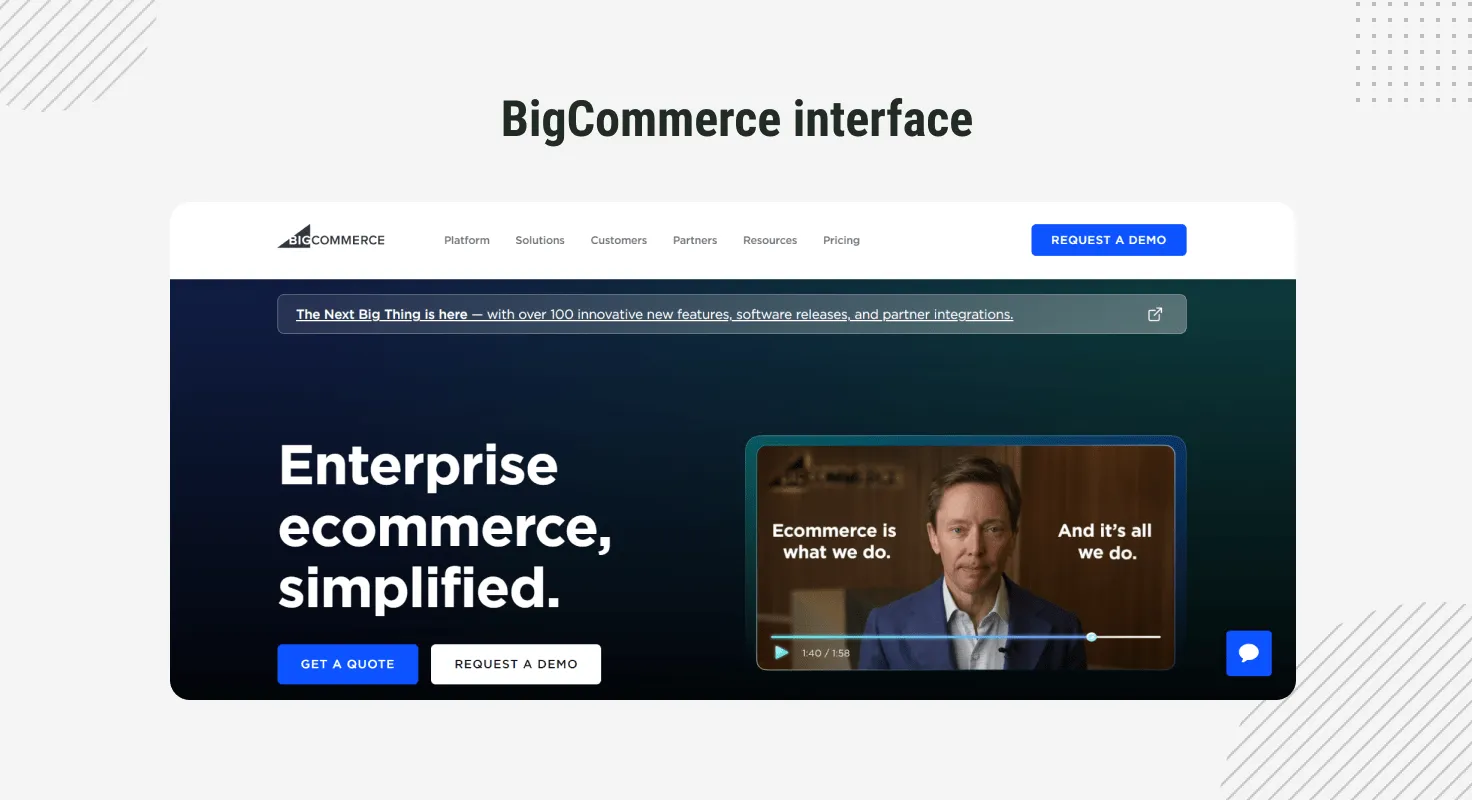
As a self-hosted solution, BigCommerce empowers business owners to establish and customize their online stores, facilitating the sale of an unlimited array of products, be it digital, physical, or services. Its accessibility via any web browser with an internet connection eliminates the need for web hosting or software installation on individual computers, enhancing ease of use and accessibility.
Magento (Adobe Commerce)
Magento, also referred to as Adobe Commerce, stands as an E-commerce solution primarily tailored for larger online retailers. This platform offers comprehensive inventory and sales management functionalities, ensuring efficient organization within your E-commerce store. Additionally, Magento provides a user-friendly page builder tool, enabling effortless creation and customization of web pages to suit your specific requirements.
Magento (Adobe Commerce) remains a popular choice for E-commerce businesses, with over 670,000 websites currently utilizing the platform. While the exact figures vary depending on the source and methodology, it's clear that Magento continues to have a significant presence in the E-commerce landscape.
Data from December 2024 indicates that 661,770 websites are using Magento, with 203,717 of those specifically utilizing Magento 2. While Magento faces competition from other platforms like Shopify and WooCommerce, its large user base and continued development make it a strong contender for businesses seeking a robust and scalable E-commerce solution.
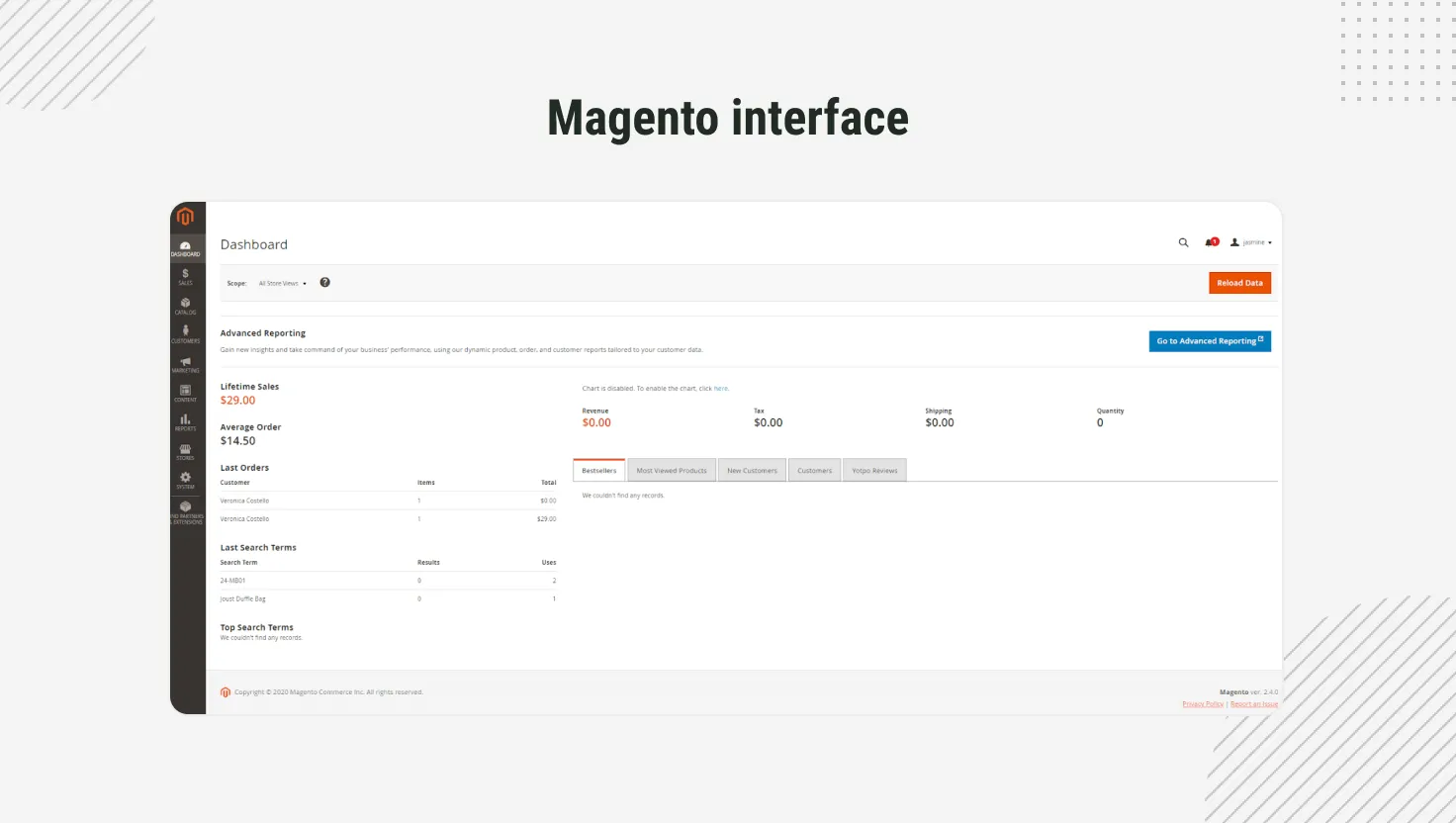
Part of the Adobe Commerce Cloud (ACC), Magento is integrated within an open-source platform designed to facilitate the personalization, management, and optimization of E-commerce stores.
Magento has two main versions: Magento 1 and Magento 2. Magento 2 is an updated version with faster loading speeds, automatic updates, and improved SEO and mobile optimization. Support for Magento 1 ended in June 2020, leaving Magento 2 as the only supported version.
How BigCommerce vs. Magento Stack Up
|
BigCommerce |
Magento |
|
|
Starting price |
$39/month for a Standard plan |
0$ is the cost for Magento Open Source; Adobe Commerce pricing is custom and available upon request from the Magento sales team. |
|
Hosting |
0$ for all plans |
0$-50$, depending on your plan |
|
Themes and design |
11 free templates and 100+ paid templates |
3 free templates and 300+ paid templates |
|
Transaction fee |
No transaction fees |
No transaction fees |
|
Integrations |
2000+ integrations with marketing, merchandising, analytics, and other essential apps |
3,600 native integrations via the Adobe Commerce Marketplace |
|
Reporting and analytics |
Access to various analytics tools (pre-built reports in the Admin Panel, Reporting in Adobe Commerce, and integration with Google Analytics) |
Provides a set of reporting tools, including customer, marketing, search data and finance reports |
|
Mobile-friendly |
Yes |
Yes |
|
Customer support |
24/7 customer support through live chat, phone support, and email |
Support through email or answers using the knowledge base |
Pricing
The pricing structure of BigCommerce is flexible, with scaling according to the additional features provided. The typical plans offered by BigCommerce span from $39 USD to $299 USD per month, ensuring affordability while delivering essential functionalities.
Moreover, for companies seeking advanced capabilities such as managing multiple storefronts and accessing the software’s application programming interface (API), BigCommerce offers an Enterprise option. For further information on this option, interested parties are encouraged to reach out to the BigCommerce sales department.
Magento offers two versions: Magento Open Source and Adobe Commerce. Magento Open Source is a free version but comes with limited features. As for Adobe Commerce, specific pricing details aren't provided upfront; interested users need to provide contact information and await a customized quote from a sales representative.
Hosting
BigCommerce provides hosting as part of its package without additional charges, ensuring convenience and simplicity for users. Conversely, Magento offers various hosting price policies, with costs ranging from $10 to $50 per month for Magento Open Source and Adobe Commerce users. However, the Adobe Commerce Cloud version includes automated and managed hosting in the license.
Templates and design
Both BigCommerce and Magento offer options for templates and design, catering to diverse aesthetic preferences and functional requirements. BigCommerce provides 11 free templates along with over 100 additional templates ranging from $150 USD to $400 USD.
Magento also offers pre-made themes. The cost of pre-made Magento themes typically falls between $0 and $200, depending on factors such as features, complexity, and performance. Alternatively, users can opt for custom theme development by engaging developers.
Integrations
Both BigCommerce and Magento offer extensive integration capabilities, enabling users to enhance the functionality and performance of their online stores. BigCommerce boasts over 2,000 integrations with various marketing, merchandising, analytics, and other essential apps. Conversely, Magento provides access to more than 3,600 native integrations via the Adobe Commerce Marketplace.
Reporting and analytics tools
Starting with the Standard plan, BigCommerce provides users with comprehensive reporting and analytics tools. These tools include customer reports detailing customer spending, origin, new vs. returning customer ratios, and order history. Additionally, marketing reports offer insights into the effectiveness of marketing campaigns in driving traffic to the store, while search data reports provide information on the search terms used by customers. Finance reports encompass sales reports, tax reports, and more, enabling users to track financial performance effectively.
Similarly, Magento offers robust reporting and analytics capabilities to users.
- Pre-built reports accessible in the Admin Panel provide valuable insights into various aspects of E-commerce operations.
- For more in-depth analysis, Magento users can utilize Advanced Reporting for comprehensive data analysis.
- Furthermore, integration with Google Analytics enhances tracking and reporting capabilities.
Additionally, users can explore third-party extensions available on the Magento Marketplace to access additional reporting features and further customize their analytics tools to suit their business needs.
Transaction fees
Unlike some other platforms, neither BigCommerce nor Magento imposes transaction fees on users, allowing businesses to maximize profits and manage finances more effectively.
Mobile-friendly
Both BigCommerce and Magento prioritize mobile-friendly design and functionality, ensuring optimal user experiences across various devices. With a focus on responsive design and mobile optimization, both platforms enable businesses to cater to the growing number of mobile shoppers and enhance engagement and conversion rates.
Customer support
Both platforms provide users access to assistance around the clock. BigCommerce offers 24/7 customer support through live chat, phone support, and email, ensuring that users can get help whenever they need it for their online stores.
Magento offers users access to live representatives for assistance. In addition to live support, Adobe Commerce provides other support channels such as email or help desk, chat, frequently asked questions (FAQs) or forums, and a comprehensive knowledge base. These resources enable users to troubleshoot issues, find answers to common questions, and access helpful resources to optimize their E-commerce operations.
Bottom Line
After evaluating the features and offerings of both BigCommerce and Magento, it's evident that each platform has its strengths and suitability for different types of businesses.
Magento emerges as the preferred option for mid-size and enterprise-level businesses due to its advanced features, customization options, and scalability. The Magento Enterprise Edition, in particular, caters to large-scale E-commerce operations and is trusted by prominent companies like Bulgari, Coca-Cola, Olympus, Asus, and HP. You can also leverage Magento consulting services to see if Magento is a good fit for your project.
On the other hand, BigCommerce offers flexibility and ease of use, making it an attractive option for small and medium-sized businesses, as well as startups just entering E-commerce. Its range of pricing plans, including an enterprise option, ensures scalability to accommodate business growth.
If you're still uncertain about which platform best suits your business needs, consider leveraging Emerline's expertise. Our team of E-commerce experts can conduct a thorough audit of your business and recommend the most suitable solution based on your budget, timeframe, and business goals.
More from Emerline
Emerline's experts constantly explore various E-commerce solutions to help you find the most suitable one for your business needs. Discover our articles with detailed insights and make an informed decision:
Updated on Feb 9, 2025


